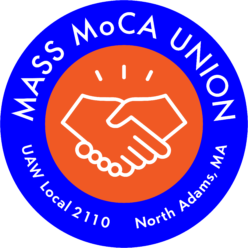- Generally speaking, what does the negotiating process look like?
- What is the purpose of the negotiating committee?
- What kinds of things can we bargain for?
- How will we ensure everyone’s concerns and grievances are heard and considered in the negotiating process?
- How can a union contract accommodate so many different interests?
- What’s the obligation to bargain in “good faith”?
- How long will it take to finalize a contract?
- After we ratify our contract, what happens next?
Generally speaking, what does the negotiating process look like?
After reviewing employee surveys, current policies, the employee handbook, and other contracts for similar employee groups — as well as having conversations with members — the negotiating committee (composed of elected bargaining unit members) draws up initial contract proposals. The number of people on the negotiation committee is relative to the amount of people in the bargaining unit. Before these proposals are presented to executive management, they will be presented to members for feedback and approval.
The negotiating committee will be trained and assisted throughout the entire process by experienced UAW Local 2110 staff.
The final contract must be ratified by members before implementation; union dues are not incurred until after the contract is negotiated and approved by members.
What is the purpose of the negotiating committee?
The elected negotiating committee will draw up initial demands for a union contract, meet with the management committee to negotiate over these demands and ultimately, make a recommendation to the membership on management’s final offer for a contract that will guarantee our compensation, benefits, job security, and workplace rights.
What kinds of things can we bargain for?
We can bargain for any term or condition of our employment, including compensation, benefits, workplace rights, etc. During the bargaining process, management cannot make any reductions in our conditions to try to force us to “bargain back” what we’ve already had. Workers at MoMA, Columbia University, NYU, the New Museum and other cultural and educational institutions within Local 2110 have made important gains in salary levels, promotion rights, job security, health benefits and workplace rights.
How will we ensure everyone’s concerns and grievances are heard and considered in the negotiating process?
Everyone will be asked to fill out a survey and be as honest and thorough as possible in answering about their priorities. Members should attend union meetings, info sessions, and actions when called, so that executives are made aware of the importance of the contract to all. All members are encouraged to stay in touch with negotiating committee members, ask questions when you have them, and give feedback throughout the process. Negotiating a first contract is a huge responsibility that will require participation by all unit members.
How can a union contract accommodate so many different interests?
It is extremely common for a union contract to cover a variety of job titles across departments within an institution. For example, at MoMA, Local 2110 represents workers in the store, visitor services, curatorial, and administrative staff. Together, they have been successfully negotiating union contracts for decades, including provisions for wage increases, stronger benefits and workplace protections.
What’s the obligation to bargain in “good faith”?
Although “good faith” bargaining will not require Management to agree to any one particular proposal, it will require them to meet with elected union representatives, negotiate with them, offer compromises, and provide necessary and relevant information to assist the bargaining. Through “good faith” collective bargaining, staff at MoMA, the New-York Historical Society, Columbia University, the ACLU and many other Local 2110 workplaces, have achieved substantial improvements in their wages and benefits, and have established job rights and security that did not exist in the past.
How long will it take to finalize a contract?
On average, it can take between 6 months to a year. But for a first contract, the process of negotiating can become protracted. The likelihood of negotiating a good contract in a shorter amount of time will be increased if the members make it clear to management that a fair offer is necessary through their unified actions and articulated support for the negotiations.
After we ratify our contract, what happens next?
After the contract is ratified, we will elect a chairperson and delegates from among our unit to serve as stewards: they will ensure that management lives up to the provisions of the contract and offer support to all members with any problems that arise in the workplace. Disputes still happen, but ultimately the union will become a normal part of the workplace.
